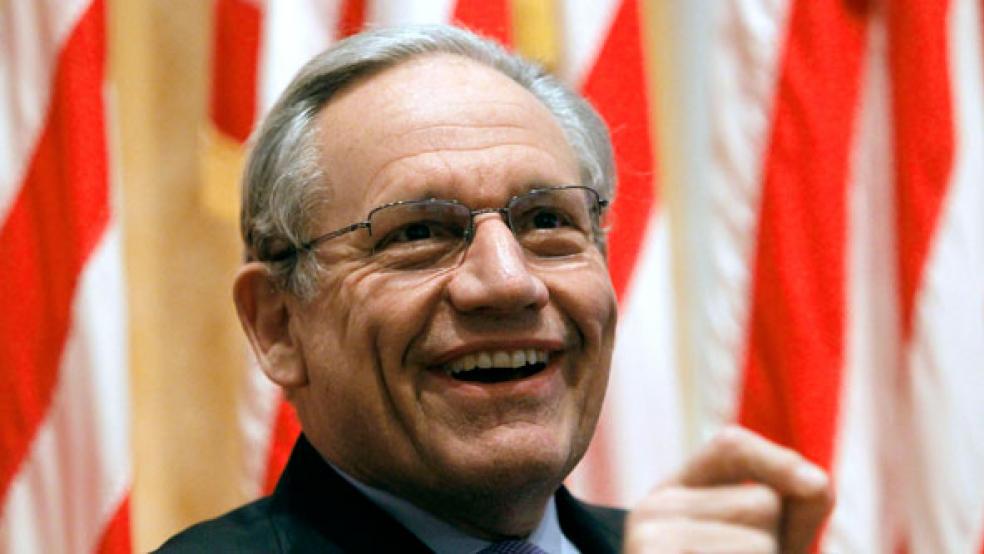The White House kerfuffle with journalist Bob Woodward took a surreal turn this week—and everything about it is getting blown out of proportion amid questions of whether a key Obama adviser tried to intimidate him into lopping off one of his arguments in a Sunday Washington Post op-ed.
Based on his reporting for the 2012 book The Price of Politics, Woodward is challenging a basic narrative from Team Obama—that the dysfunctional policies and gridlock have been caused by congressional Republicans.
And here is the real conclusion that is getting overlooked by the hubbub of whether the White House threatened the best-selling author: The White House not only mishandled the 2011 deal that set-up the sequester, but it also didn’t know how to respond to the evidence that Woodward presented with anything other than outrage.
“When they get their rear end in a crack, they become defensive,” Woodward told POLITICO.
This is key because it sheds light onto how crucial negotiations are being handled that will shape the economy—the debt ceiling, the budget, etc. The mess explains how much the White House wants to defend their story that the GOP solely deserves the blame. Both sides engaged in behavior that was destructive toward addressing the fiscal issues that threaten our economy, even if multiple polls show that Republican obstinacy has gone against the wishes of the voting public.
Let me declare my bias: I worked with Woodward on his 2010 book “Obama Wars.” He tends to marshal his evidence carefully from internal documents and transcriptions of interviews that can last for several hours. His books dissect how power is used, when most of our political coverage is about how power is pursued.
But the question of the White House response and what it means has been overshadowed by an email from Gene Sperling, the director of the National Economic Council.
Sperling disagreed with Woodward’s conclusion in The Washington Post that Obama had moved the “goal posts” by insisting that tax hikes be used to replace the $85 billion worth of across-the-board budget cuts slated to begin on Friday. Woodward said tax increases were based on his reporting a possibility for avoiding the sequester as part of the original 2011 deal, but not a replacement for it.
The Obama aide yelled at Woodward for 30 minutes and then sent an apologetic email that has since been made public.
“I do understand your problems with a couple of our statements in the fall — but feel on the other hand that you focus on a few specific trees that gives a very wrong perception of the forest,” Sperling wrote in the message obtained and reprinted by POLITICO. “But perhaps we will just not see eye to eye here.
“But I do truly believe you should rethink your comment about saying saying that Potus asking for revenues is moving the goal post. I know you may not believe this, but as a friend, I think you will regret staking out that claim.”
Many journalists are skeptical about whether the word “regret” amounts to a veiled attempt to bully Woodward, something that was insinuated by the journalist himself in multiple interviews.
Twitter is full of opinions that Woodward is a has-been and should retire.
Yet it’s worth stepping back and getting context on this issue.
For starters, Woodward does not intimidate easily. The story itself always came first for him, more so than his own ego, based on my experience. So while I don’t think that Woodward felt threatened, I can understand why a reporter without his stature and independence might feel that way.
Yelling at Woodward was going to fail as a tactic, as would attempts in Sperling’s email to assuage him as a “friend.” The White House misread him.
Secondly, Sperling uses the adage that Woodward is focusing on “a few specific trees” rather than the forest. This is a revealing statement about the situation, because the essence of what Woodward does is detail-oriented. Politicans usually speak of intentions, whereas Woodward cares about what actually happened rather than what someone wanted to have happen.
The trees that Woodward glimpsed from his reporting were inconvenient for the White House narrative. He wrote that Team Obama dreamed-up the idea of the sequester cuts, a plan that both Obama and Treasury Secretary Jack Lew tried during last year’s presidential campaign to pawn off on the Republicans.
Finally, Woodward didn’t imagine these conclusions. They came from reportage. And if the White House feels it is sincere in its outreach to Republicans, his sources know the feeling is far from mutual. But it’s also worth acknowledging a difficulty for Obama—or any president—that gets lost in the forest of daily media coverage.
Almost every choice that faces his desk is tough. The probability that the president gets something wrong is relatively high, a reality that gets lost in much of the messaging. Obama himself noted this phenomenon in an interview with Michael Lewis for Vanity Fair.
“Nothing comes to my desk that is perfectly solvable,” Obama said at one point. “Any given decision you make you’ll wind up with a 30 to 40 percent chance that it isn’t going to work. You have to own that and feel comfortable with the way you made the decision.




